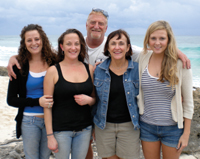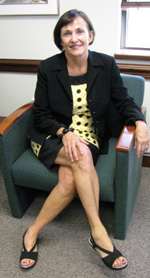|
By Dawn Brazell
Public Relations
Kathleen Brady waves off
being named the No. 1 most NIH-funded psychiatrist in the nation, a
recognition she was surprised to receive earlier this year.
Brady, M.D., Ph.D., a MUSC
psychiatrist and Distinguished University Professor, attributes her
involvement in several large grants as what led to the ranking. "I
don't really spend a lot of time thinking about what everyone else is
doing."
What she does spend time
on is her specialty area of substance abuse and the changes that are
reshaping that field.
"Research is my passion. It's what I enjoy doing and thinking about.
It's always exciting, always new and never monotonous. You come to work
every day and pretty much face a different challenge," said Brady, who
also holds the titles of director of clinical programs in MUSC's
Clinical Neuroscience Division and director of the S.C. Clinical and
Translational Research Institute (SCTR).
 Dr. Kathleen Brady, center, with
her husband, Dr. Robert Bruce Lydiard, and their daughters, from left,
Monica, Jessie and Claire in Cozumel. Dr. Kathleen Brady, center, with
her husband, Dr. Robert Bruce Lydiard, and their daughters, from left,
Monica, Jessie and Claire in Cozumel.
"There's a lot of
flexibility in research, so if you're heading down one avenue asking a
series of questions and something comes up that may appear at first to
be an aberrant finding, it can lead to a whole different and productive
line of questioning."
Her eyes light up at the
thought—just as they have been for decades when she talks about
research. With the precocious start of getting a paper published in
"The Journal of Experimental Analysis of Behavior" when she was in the
fourth grade, Brady knew she enjoyed research.
"It was a report I had
done that had won a science fair. It was having rats run through a
maze. They were searching for food at the end, and as they learned the
pathways, they made fewer and fewer errors. It was a learning
experiment."
For Brady as well, as it helped set her on the path to a medical career.
Her father, an
experimental psychologist and emeritus researcher at John Hopkins
University, has been an important mentor and guide in her life.
Another important
influence was the loss of her mother, who had been ill for several
years, when she was in the fifth grade. The middle of five children,
Brady said all of her siblings learned to be independent.
"Part of my resilience
comes from being able to handle those pretty dramatic changes and
losses at an early age. It made me really close to my siblings and my
father at an early age. We really appreciated each other."
Balancing
act
It's a lesson she never forgot.
Colleague Lina Obeid,
M.D., said Brady is unusual in how she blends several talents, while
balancing a full, personal life. "She's accomplished all around—her
personal life, her children, her work, her social life—it's all very
well integrated and seamless. She's my role model for how she puts all
these things together in her life."
Obeid's not the only one
amazed. Friend Susan Staub loves how Brady's personal life, as a wife
and mother of three daughters, is just as successful as her
professional life. She has the knack of making whomever she's around
feel important. Staub recalls going through a difficult period in her
life and remembers Brady calling her just to check on her.
Staub asked her where she
was, and Brady replied she was in a London airport. "She was thousands
of miles away, thinking of me."
That is typical for Brady.
She's had Brady call her just before she's about to speak at a
conference. "She's a fabulous friend. She's supportive and caring.
She's there for people. If something ever happened to me, my kids would
turn to her."
Sometimes Staub, a social
worker, gets a surprised reaction from people who want to know why
Brady hangs out with her since she's not a researcher or doctor. Staub
describes Brady as a compassionate and non-judgmental person.
"She's not in any way
someone who is a snob. She never puffs herself up. She has a right to,
but she never does."
Another quality Staub and Obeid note about her is her high energy.
Staub and Brady, whom she describes as a playmate, like to take
mile-long swims parallel to the Sullivan's Island beach. When Brady
went to Australia earlier in the year for a three-month sabbatical,
Staub went to visit. She was amazed that one of the first things Brady
did when she got there was buy a bike to ride into work, which was
several miles away through a tricky terrain.
"I would have lacked the
spunk to do that. She has a lot of can-do in her," she said, describing
how she's not afraid of new activities. "If something interests her,
she's going to dive right in."
That's true
professionally, as well, which has led to an impressive array of
academic and administrative appointments as well as awards, which
include a "Women of Achievement" award from the state and a Betty Ford
award for her contributions to research on women's issues in substance
abuse.
Obeid said Brady is
internationally recognized and in high demand in her field, and lands
the competitive grants because she stays ahead of the curve. When MUSC
was struggling to get what is now SCTR going, Brady stepped in to help
get a $20 million award from the National Institutes of Health to
establish a center for translational science at a time when there were
very few in the country.
"She put MUSC on par with
outstanding schools. It comes naturally to her to put people together
and write good grants. She's always pushing the envelope and taking
things to the next level, but with a charm and a grace and a soft
manner. I've never seen her lose her temper. She's always so gentle and
so nice."
Master
collaborator
When asked about her role in getting SCTR started, Brady said it was a
need for the university, so she decided to take it on. "As I got
involved, I saw it in the same way I saw my research questions as far
as a problem that needs to be solved. You can put your skills and
talents toward trying to figure out the best approach to facilitating
translational research. I'm interested in the larger issues of how to
set the scene to facilitate research and discovery and collaboration.
I've turned more to organizational and administrative things to foster
research. "
That fostering requires
changes at the individual level in getting basic scientists working
more closely with clinicians and in getting clinicians working with the
community. Translational research requires applying incentives and
developing a network with area physicians, and even better getting
those physicians involved with the research so that they understand it,
she said.
"They can be our best
advocates among their peers then. 'Have you tried this sort of therapy
or this kind of medication? I did a study with it.' I think that's much
more convincing often in terms of people adopting new treatments than
some big academic person coming down in a white coat saying you need to
do this."
 Dr. Kathleen Brady Dr. Kathleen Brady
Brady, who met her
husband, R.B. Lydiard, Ph.D., M.D., at the Medical College of Virginia,
followed him to MUSC, where she finished her medical degree in 1985.
She's been glad to stay because she likes how the smaller campus
fosters a collaborative environment.
"I've never had anybody
not be very willing to get together and collaborate on a project. I
think that atmosphere of cooperation—the idea that we're all in this
together and we need to link arms to improve the stature of the
university—that everybody is on board with that."
Always drawn to the area
of neuroscience, Brady said she still feels passionate about her
research into substance abuse and addiction.
"I've always been moved by
the sadness and disruption and far-reaching consequences of substance
use disorders. When I started in the field addictions were
misunderstood and thought of as bad behaviors and not as something that
is a medical disorder that warranted medical treatment. They are still
stigmatized disorders, but I think the attitudes about them have
changed to some extent. It was a fascinating area to me and an
underserved area in terms of research and clinical care."
She's seen tremendous
change during the past 30 years from the development of personalized
medications to attitude shifts to provide much more enlightened
treatment. She's curious about how advances in neurobiology will be
able to accelerate the development of substance abuse treatments.
"When I look at the
advances made in certain areas of medicine—cancer, surgery—when I see
how improved treatments are, I can see how much better we're doing and
how much better we can be doing. There's lots of room for improvement,
and you're never going to make those improvements if there's not
research."
It's not just her area that she wants to promote, though. Brady said
she's excited to be filling more of a mentoring role for upcoming
researchers who show passion for their fields.
"At this point I can see
the limits of what I'll be able to do. It's a very gratifying thing to
mentor these people who you know will go on to do great things. To see
someone get excited and know that they're going to take that passion
and move forward and do some positive things, that's very gratifying
for me."
Brady's Life Lessons
Advice to
reasearchers
"It's really important
to keep balance in your life and find something that you're
passionately interested in because that's what it takes. It helps to be
really focused and passionate about your research. The funding
atmosphere is getting worse from what we hear. It's going to take a lot
of dedication."
Despite that it's still important to have balance and take care of your
health, family and loved ones, she said.
"Keep everything in its place."
How she handles
being overwhelmed
"I sit down and
prioritize. I deal with tasks one at a time or ask for help. It's a
good thing to know that you don't have to do it all by yourself."
Advice to women
"Women need not to be
afraid to be assertive. They should expect fair treatment and ask for
what they deserve. You can be pleasantly assertive and know what your
worth is."
Brady said this is
something she's gotten better at as she's gotten older, and it is a
skill women can learn, whether they were raised in Maryland as she was
or from the South.
"I've seen some
really powerful Southern women who know how to get what they need. Some
with awesome negotiating skills. In fact, they surprise you. That's
part of what makes it so powerful. With all that charm, you just don't
see it coming."
How she keeps
balanced
She swims every day
either in the pool or the ocean. She enjoys outdoor activities and
loves reading.
Items on her
bucket list
None. She said she's
living her life now, traveling and doing what she wants to do while she
has the energy and enthusiasm. "We never know what tomorrow is going to
bring."
|



 Dr. Kathleen Brady, center, with
her husband, Dr. Robert Bruce Lydiard, and their daughters, from left,
Monica, Jessie and Claire in Cozumel.
Dr. Kathleen Brady, center, with
her husband, Dr. Robert Bruce Lydiard, and their daughters, from left,
Monica, Jessie and Claire in Cozumel. Dr. Kathleen Brady
Dr. Kathleen Brady